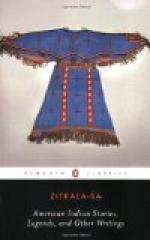All too soon the picture was gone. Chief High Flier awoke. He lay prostrate on the floor where during the night he had fallen. He rose and took his seat again upon the mattress. Another day was ushered into his life. In his heart lay the secret vision of hope born in the midnight of his sorrows. It enabled him to serve his jail sentence with a mute dignity which baffled those who saw him.
Finally came the day of his release. There was rejoicing over all the land. The desolate hills that harbored wailing voices nightly now were hushed and still. Only gladness filled the air. A crowd gathered around the jail to greet the chieftain. His son stood at the entrance way, while the guard unlocked the prison door. Serenely quiet, the old Indian chief stepped forth. An unseen stone in his path caused him to stumble slightly, but his son grasped him by the hand and steadied his tottering steps. He led him to a heavy lumber wagon drawn by a small pony team which he had brought to take him home. The people thronged about him—hundreds shook hands with him and went away singing native songs of joy for the safe return to them of their absent one.
Among the happy people came Blue-Star Woman’s two nephews. Each shook the chieftain’s hand. One of them held out an ink pad saying, “We are glad we were able to get you out of jail. We have great influence with the Indian Bureau in Washington, D.C. When you need help, let us know. Here press your thumb in this pad.” His companion took from his pocket a document prepared for the old chief’s signature, and held it on the wagon wheel for the thumb mark. The chieftain was taken by surprise. He looked into his son’s eyes to know the meaning of these two men. “It is our agreement,” he explained to his old father. “I pledged to pay them half of your land if they got you out of jail.”
The old chieftain sighed, but made no comment. Words were vain. He pressed his indelible thumb mark, his signature it was, upon the deed, and drove home with his son.
* * * * *
AMERICA’S INDIAN PROBLEM
The hospitality of the American aborigine, it is told, saved the early settlers from starvation during the first bleak winters. In commemoration of having been so well received, Newport erected “a cross as a sign of English dominion.” With sweet words he quieted the suspicions of Chief Powhatan, his friend. He “told him that the arms (of the cross) represented Powhatan and himself, and the middle their united league.”
DeSoto and his Spaniards were graciously received by the Indian Princess Cofachiqui in the South. While on a sight-seeing tour they entered the ancestral tombs of those Indians. DeSoto “dipped into the pearls and gave his two joined hands full to each cavalier to make rosaries of, he said, to say prayers for their sins on. We imagine if their prayers were in proportion to their sins they must have spent the most of their time at their devotions.”




